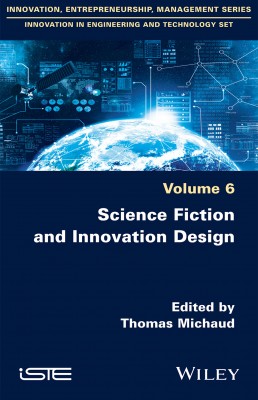Towards an ethical use of science-fiction by businesses
Science-fiction offers futuristic tales in which utopian technologies occupy an important place. They often inspire engineers and people interested in design fiction in the research and development departments of technoscientific companies. Designers are often influenced by this imaginary, even if some of them believe that science-fiction is no longer enough to offer creative concepts and that it must be overcome by another practice close to more speculative forms of art. However, we were able to observe that the robotics, space conquest and in particular planter Mars, or military sectors, for example armors of the future, generated an abundant imaginary which in return fed the reflections of researchers, more and more aware that science-fiction is not only a hobby, but also an element of prospecting and foresight on future technologies and on the future applications and uses of innovations. It is no coincidence that design fiction is a formula invented by cyberpunk sci-fi author Bruce Sterling. Along with William Gibson, he was one of the leaders of a very influential current in the computer science communities of the 1980s-90s, at the origin of the Internet and ICT.
Science-fiction at this time imagined many concepts such as cyberspace, the metaverse, electronic currencies, exoskeletons, virtual worlds, the multiple uses of nanotechnologies and biotechnologies, in the lineage, but also in the foreground of a research still in its infancy in laboratories around the world. Sterling and the cyberpunks often imagined utopian technologies that contrasted with the everyday lives of decadent heroes living in societies in which multinationals had all the power. Design fiction does not have the function of social criticism of science-fiction, even if some organizations can seize it to imagine the means of struggles against powers that are a little too alienating. It is designed more as a tool to help develop new concepts, prototypes, especially technological ones. It essentially retains the utopian side of science-fiction, seeking to create innovations and a better world, potentially revolutionary products and sources of profitability for the companies that imagine and will develop them.
Stimulating the imaginary is imperative for companies if they are not to be condemned to follow the worldviews of dominant players in the global economy. However, an ethical question arises in the face of an unbridled use of the science-fictional imaginary by profit-hungry companies. Science-fiction is often made up of nightmares and dystopias. Violence is omnipresent, the future is sometimes chaotic and heroes need remarkable qualities to avoid problematic situations due to the development of technosciences. It is therefore to be feared that a company will adhere to design fiction and develop a dystopia that it would seek to achieve, risking in this way creating a negative world. Managers and leaders need to be as positive as possible in order to create a better world. Imagination and design fiction must therefore be subjected to a critical and ethical gaze in order to optimize their productions and direct them towards products favorable to consumers. Just because a utopian or dystopian technology is potentially profitable does not mean it should be realized. Science-fiction must be filtered by leaders through an ethical prism and inserted into a strategic discourse that will retain only the useful and positive elements, purging it of the many negative and dystopian elements that characterize many of its works. Speculative design, more academic, could well constitute a critique of design fiction and a possible science-fictional drift of the imaginary of the productive system. Thinking about the future with science-fiction is a strategic necessity as this art is so creative and has shown its ability to anticipate situations and technologies for two centuries. The instrumentalisation of science-fiction by states like China and by multinationals, however, questions the possible excesses that could be generated by an imaginary that the author Neal Stephenson has denounced as dangerously dystopian in recent years. For science-fiction and design fiction to remain interesting for businesses and for capitalism, they must regain their utopian dimension. Consumers are also waiting for new, less polluting technologies and a productive system that is more respectful of the environment. Science-fiction could imagine a greener world, thanks to technology. The current of climate fiction is already considering the dystopian aspects of global warming, but also the solutions to this major crisis that challenges capitalism in the coming decades.
Capturing the critiques and proposals of science-fiction must be the subject of exploratory and forward-looking programs on the part of the institutions which govern the world in order to better anticipate and develop policies and strategies for the future.
Thomas Michaud
Research Network on Innovation
See more:
 |
Science Fiction and Innovation Design
|

